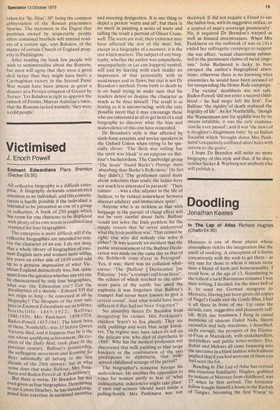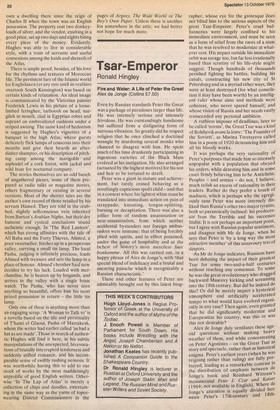Doodling
Jonathan Keates
In The Lap of Atlas Richard Hughes (Chan° £4.95) Morocco is one of those places whose atmosphere tickles the imagination like the smell of cooking. A conception of it forms concurrently with the wish to get there at any rate for those to whom it means more than a blend of hash and homosexuality. 1 recall how, at the age of 13, floundering in the toils of a lurid Ruritanian romance! was then writing, I decided, for the sheer hell of it, to send my German margrave to Morocco. Having just been given old copies of Nagel's Guide and the Guide Bleu, I had it all there in front of me. Up came the details, easy, suggestive and pleasantly raffish. With due brashness I flung in casual mentions of sinuous Ouled Nails, lissom caouadjis and holy marabous. I described, airily enough, the prospect of the Djeinael-Fnaa at Marrakesh, with snakehandlers, storytellers and public letter-writers. Fez. Rabat and Meknes all came bouncing into the narrative in a blasé fashion which almost implied that if you had seen one of them you had seen the lot.
Reading In The Lap of Atlas has revived this vicarious familiarity. Hughes, grabbed by notions of Morocco from childhood. was 27 when he first arrived. The fortunate fellow bought himself a house in the Kasbah of Tangier, becoming the first 'Frank' to own a dwelling there since the reign of Charles II when the town was.an English possession. The property cost two donkey loads of silver, and the vendor, exulting in a good price, sat up two days and nights biting every piece of the money. Evidently, Hughes was able to live in considerable style, with a train of servants and useful connexions among the kaids and sherecfs of the Atlas.
There is ample proof, besides, of his love for the rhythms and textures of Moroccan life. The persistent lure of the Islamic world for Englishmen (at any rate until its realities overtook South Kensington) was based on certain kinds of relaxation. An ideal image is communicated by the Victorian painter Frederick Lewis in his picture of a looselimbed feringhee, tarboosh on head, nargileh in mouth, clad in Egyptian robes and asprawl on embroidered cushions under a striped awning. The same kind of hedonism is suggested by Hughes's vignettes of a banquet in the high Atlas, where guests delicately flick lumps of couscous into their mouths and give their beards an afterdinner shampoo, or his description of pitching camp among the marigolds and asphodel of a cork forest, with jackal and wild boar for nocturnal company.
The stories themselves are an odd bunch of ungathered pieces, some of them prepared as radio talks or magazine stories, others fragmentary or existing in several versions. Most of the shorter tales are the author's own record of those retailed by his servant Hamed. They are told in the crabbed, slightly selfconscious vein inherited from Burton's A rabian Nights, but their dry humour and cynical conclusions sound authentic enough. In 'The Red Lantern', which has strong affinities with the tale of Ali Baba and the Forty Thieves, Ahmed, a poor sweetseller, fetches up in a prosperous valley, carrying a small tin lamp. The local Pasha, judging it infinitely precious, loads Ahmed with treasure and sets the lamp in a place of honour. Ahmed's brother Said now decides to try his luck. Loaded with merchandise, he is beaten up by brigands, and arrives in the valley with a single brass watch. The Pasha, who has never seen anything so beautiful, offers him his most prized possession in return — the little tin lamp.
Only one of these is anything more than an engaging scrap. 'A Woman to Talk to' is a novella based on the life and personality of T'hami el Glaoui, Pasha of Marrakesh, whom the writer had earlier called 'as bad a hat as are made'. Those in search of authentic Hughes will find it here, in his subtle manipulations of the unexpected, his evocations of brutally interrupted tenderness and suddenly stifled romance, and his incomparable sense of swiftly rushing nemesis. It was worthwhile having this to add to our stock of works by the most maddeningly unprolific of good English writers. Otherwise 'In The Lap of Atlas' is merely a collection of chips and doodles, entertaining in the same way as the yarns of topeewearing District Commissioners in the pages of Argosy, The Wide World or The Boy's Own Paper. Unless there is another fox somewhere in the attic, we had better not hope for much more.



































 Previous page
Previous page